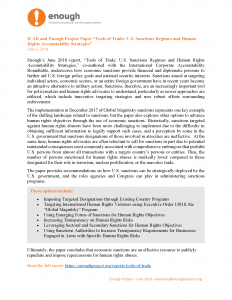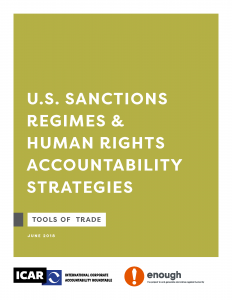New FinCEN Advisory Focuses on Essential Links between Corrupt Networks and Human Rights Abuses
Today, the U.S. Treasury Department’s Financial Crimes Enforcement Network (FinCEN) issued a new Advisory, Advisory on Human Rights Abuses Enabled by Corrupt Senior Foreign Political Figures and their Financial Facilitators, which focuses financial institutions on the urgent need to investigate and target the actions of corrupt Senior Politically Exposed Persons and their networks of facilitators and enablers around the world. The Advisory makes the critical connection of the corruption of these networks to grave human rights abuses, including in sub-Saharan Africa ...
The Sentry Welcomes Treasury Under Secretary’s Historic Trip to Sub-Saharan Africa; Represents Critical Opportunity for Impact on Urgent Crises
Serious financial pressure with meaningful consequences is not only possible but critically necessary to counter violent kleptocracy, protect human rights and end conflict ...
Tools of Trade: U.S. Sanctions Regimes and Human Rights Accountability Strategies

Download the one-pager here. Enough’s June 2018 report, “Tools of Trade: U.S. Sanctions Regimes and Human Rights Accountability Strategies,” co-authored with the International Corporate Accountability Roundtable, underscores how economic sanctions provide financial and diplomatic pressure to further aid U.S. foreign policy goals and national security interests. Sanctions aimed at targeting individual actors, economic sectors, or an entire foreign government have in recent years become an attractive alternative to military action. Sanctions, therefore, are an increasingly important tool for policymakers and human rights advocates to understand, particularly as newer approaches are utilized, which include innovative targeting strategies and new robust efforts ...
“Tools of Trade”: Resource Paper Explains U.S. Sanctions Regimes and New Human Rights Accountability Strategies
New resource paper empowers human rights practitioners and advocates to stay engaged through lifecycle of powerful but often underutilized sanctions regimes ...
Just Published: Understanding Sanctions and Human Rights

In this new paper, the International Corporate Accountability Roundtable and Enough Project lay out the essential elements of how sanctions programs are created, implemented, and enforced ...
Tools of Trade

Tools of Trade: U.S. Sanctions Regimes & Human Rights Accountability Strategies By: International Corporate Accountability Roundtable and the Enough Project Read the full report here. Economic sanctions provide financial and diplomatic pressure to further U.S. foreign policy goals and national security interests. By targeting individual actors, economic sectors, or an entire foreign government, sanctions are an attractive alternative to softer diplomatic options and drastic military action for the U.S. government to act upon its positions before the international community. Because sanctions are a malleable tool that can be tailored to specific situations, their use has risen to address a wide ...
The Daily Beast Op-ed: Congo’s Looting and Killing Machine Moves Into High Gear
This op-ed originally appeared in The Daily Beast and was written by Enough Project Founding Director John Prendergast ...
Delaying Consequences Emboldens Peace Spoilers in South Sudan
On Thursday May 31st, the UN Security Council voted to renew the sanctions regime on South Sudan for 45 days but refrained from sanctioning six high-level political and military leaders with command and control responsibilities pending a review of compliance to the Cessation of Hostilities (CoH) agreement signed at the recently concluded High Level Revitalization Forum in Addis Ababa, Ethiopia ...
Applications Open for Next School Year! Enough Project’s Student Upstander Program

The Enough Project’s Student Upstander program is designed to develop a network of committed student activists on campuses across the country to draw on the power of student leadership to support peace in East and Central Africa. Apply for the 2018-2019 academic year now ...
Study Finds Reliance on Outdated Data Leads to Exaggeration of Negative Impacts Attributed to Dodd-Frank 1502
A recent article in Resources Policy found that individuals, academics, and companies that continue to argue that the U.S. Dodd-Frank legislation’s Section 1502 on conflict minerals has resulted in unintended negative consequences in D.R. Congo are largely relying on outdated data ...

